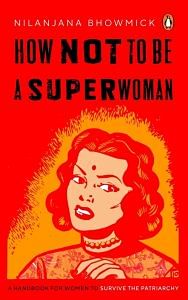‘Mother/parenting guilt seems to be something that I have to make peace with. I remind myself and my daughter that I’m human and I will make mistakes whether I like it or not, and we both need to work on it and guide each other to make things better. So essentially, communication is the key here,’ one woman I spoke to told me. And if you are unfortunate enough to be a millennial mom, dumped into an age of mom influencers all over the internet and social media, you have it so much harder.
As a Psychology Today article says, ‘In the world of Pinterest and Instagram, it’s never been harder to be a mom. Perfectionism has reached new heights.’ A Washington Post article titled ‘Millennials are tired of trying to be perfect moms’, put it out there more mercilessly:
For generations, mothers have shouldered the weight of an illusory ideal, the daunting societal standards that shape our perception of what motherhood should be. This pressure is particularly acute for millennial moms who arrived at parenthood in the age of social media, with a deluge of imagery and information constantly at their fingertips. There are parenting forums and TikTok stars and experts and influencers, discussing what the latest study reveals about screen time, how you should respond when your child has an emotional outburst, and why the colours you choose to decorate your child’s bedroom might affect their mental health. There are friends and fellow parents, posting carefully curated snapshots of their family lives.
Being a borderline millennial mom, I have had to beat this too. The constant attack by supermoms on social media about the right way to bring up children is more exhausting than the tirade that our generation had to put up with from our families and friends. I wanted to be the mother who drew smiley faces on their child’s sandwich with ketchup or cut them into cute teddy shapes. These reels and videos heap perfection pressure on mothers, and double and triple their mother guilt.
Also read: Delhi, Hyderabad, Calcutta live with memory of loss. There’s a lost city in each of them
‘Mother’s guilt used to literally kill me,’ says one of my interviewees. ‘I would blame myself every time the baby cried. Every illness was my fault.’ ‘I try to breathe through it and talk to myself and rationalize a bit,’ says another mother. ‘The burden of a mother’s guilt is something many women grapple with, and it’s rooted in the profound societal shift from the traditional archetype of what a woman should be. This shift can evoke a sense of grief and guilt because these expectations are omnipresent in our lives,’ Dr Yadav says.
As a working mother, Dr Yadav herself negotiates the challenge of balancing her role as a mother and a doctor. ‘And yes, I do feel guilt at times.’ To cope with this guilt, Dr Yadav has adopted a few strategies. ‘Firstly, I’ve normalized it. I accept that as a working mother, experiencing guilt is a part of my journey. I don’t resist it, suppress it, fight it or deny it. When it arises, I acknowledge it and sit with it. Secondly, I’ve set clear boundaries around my work to ensure I can allocate quality time to my daughter and also to my professional commitments. These boundaries help me strike a balance.
Thirdly, I’ve examined and worked on the beliefs I hold about myself. If I believe I deserve to excel in my work and as a mother, it helps alleviate guilt. However, unrealistic beliefs such as thinking I must provide a home-cooked meal for my child every single time can contribute to guilt. So, adjusting these beliefs has been essential for me.’ Dr Yadav says that what is also important is to recognize that every mother is different. ‘I recognize that I am a different kind of mother compared to my own, as times have changed. My mother was an exceptional mother who could devote all her time to me. I’ve come to terms with the fact that I won’t be able to replicate that entirely, but I’ve found my own way of being a good mother while pursuing my career.
When guilt arises, I use it as an opportunity to reflect on how I can do better, but most of the time, I allow myself some grace. I thoroughly enjoy my work, and by establishing clear boundaries between work and family, I’ve managed to navigate this journey more smoothly.’ Mothers experience a higher level of guilt when they are unable to balance home and work and this, in turn, influences their professional decisions, which may seem like choices but are actually a result of gender-based socializations and norms and hence, ‘influenced choices’ rather than ‘free choices’. When women abandon their careers, they might say and convince themselves that it is because of their want for family time, but in reality, it is because they are unable to balance their personal and professional lives, and since society expects them to prioritize their caregiving roles anyway, it is a no-brainer that they would either eave their jobs or cut back on their hours.
Women are socialized to internalize this not just through societal and familial indoctrination through their lives but also more subtly, through women’s portrayal in popular media—including in advertisements— as well as through the language we use. In 2019, a research article, ‘The Multiple Dimensions of Gender Stereotypes: A Current Look at Men’s and Women’s Characterizations of Others and Themselves’, found that ‘gender stereotypes often are internalized by men and women.’
These stereotypes are perpetuated subtly and not so subtly in the image of the man as a dominant and adventurous personality—one who is not averse to taking risks—while women are portrayed as weak, submissive and emotional and hence, more suited to emotional and physical nurturing. It is thus unsurprising, that most of the guilt women feel in a day is related to their roles as nurturers and caregivers. And more than 96 per cent of women feel guilty at least once a day—do the math; that’s feeling guilty 24/7/365.
 This excerpt from Nilanjana Bhowmick’s ‘How Not To Be A Superwoman’ has been published with permission from Penguin Random House.
This excerpt from Nilanjana Bhowmick’s ‘How Not To Be A Superwoman’ has been published with permission from Penguin Random House.



